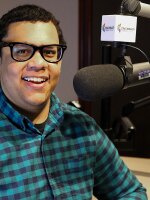Black hairstyles don't only allow for people to express themselves freely, but offer a window into African history.
Kent State University professors discussed how stories of people of African descent are expressed through hair during a virtual event hosted by the National Underground Railroad Freedom Center Thursday.
Tameka Ellington, Ph.D., and Joseph Underwood, Ph.D., co-curated an exhibition at the Kent State University Museum titled, TEXTURES: The History and Art of Black Hair, which uses history, fashion, art and visual culture to reassess the “hair story” of peoples of African descent. The exhibition ends Aug. 14.
The four themes typically conveyed through Black hairstyles are age, gender, faith, and occupation. Underwood explains hairstyles were used not only for self-expression, but to display one's status within a community.

"Thousands of years ago, tracing back to ancient Egypt, we already see that hair is sending messages," Underwood said. "It's communicating something about the people, what they believe, who they are to others."
When Africans were captured and sold into slavery, their heads were typically shaved not only to dehumanize them, but to strip their identities. Ellington says the traditional hairstyles are influenced by the desire to maintain heritage despite atrocity.

"As we're going through these things, how do we try to maintain some of our history, some of our traditions as we're being transported from our home to 'the new world?'", Ellington said.

As slavery continued, divisions developed on how Black hair should be styled. Despite both being enslaved, the hierarchy between house slaves and field slaves divided them. House slaves tended to wear straight hair, while field slaves wore natural hair. Ellington says that divide continues today through modern hairstyles.
"We still have this unspoken divide among ourselves, this colorism and 'texturism' we're still dealing with and we call this 'good and bad hair,'" Ellington said.
Black women wear various hairstyles today, but there's still a divide amongst them. Roughly 60% wear their hair straight, and 40% wear natural hair (using no chemicals) according to Mintel Market Research.

"We have so many different variations going on, and it's really critical that we look at and analyze why we wear our hair the way that we do," Ellington said. "What statement are we putting out to society about who we are as Black people? What do we want others to see us as when we represent ourselves in society?"
When asked about white people wearing Black hairstyles and the thin line between appreciation and appropriation, Ellington says that it's "detrimental" to Black culture because Black people are still being demeaned for their hairstyles. Meanwhile, white people are seen as having "trendy" hairstyles.
"We're still fighting for the right to be able to wear our hair the way that we want to wear it, the CROWN Act," Ellington said.



